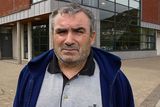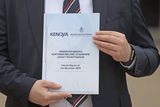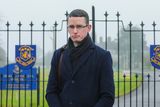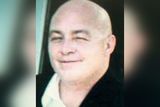‘Stakeknife’ probe: British army mole at top level of IRA probably cost more lives than saved, Kenova report finds
The interim findings of Operation Kenova examined 101 murders and abductions linked to the IRA unit responsible for interrogating and torturing people suspected of passing information to the security forces during the TroublesThe agent called Stakeknife is widely believed to have been Freddie Scappaticci, who died last year aged 77Report compiled by Bedfordshire police calls for UK government and IRA, as well as security forces to apologise to victims



More lives were probably lost than saved through the British army's operation of its top agent inside the IRA's internal security unit during the Troubles, a major independent investigation has found.
The interim findings of Operation Kenova examined 101 murders and abductions linked to the IRA unit responsible for interrogating and torturing people suspected of passing information to the security forces during the conflict.
Operation Kenova, which was undertaken by Bedfordshire Police and ran for seven years at a cost of approximately £40 million, examined the role of the Army's prized agent embedded in the heart of the IRA's Internal Security Unit (ISU), an individual known as Stakeknife.
The agent Stakeknife was widely believed to be west Belfast man Freddie Scappaticci, who was 77 when he died last year.
The Operation Kenova report stops short of confirming Scappaticci as Stakeknife.
However, it says that the Kenova team had passed "strong evidence of very serious criminality" by Scappaticci to prosecutors in Northern Ireland prior to his death.
The report also dismisses rumours that Scappaticci might still be alive.
Among 10 recommendations in the 208 page report, is a call for the UK authorities to review the application of the Neither Confirm Nor Deny policy (NCND) that currently prevents the identification of agents involved in many historical Troubles cases.
It links the "dogmatic" policy with a failure to secure prosecutions in some Troubles cases.
The report also calls on the UK and the IRA to apologise to bereaved families and victims of the ISU; the security forces for failings amid a "maverick" culture for handling agents and intelligence; and the IRA for the abduction, murder and torture of people it suspected of being agents, and linked campaigns of intimidation against their families.
The Kenova investigation was originally headed up by former Bedfordshire Police chief constable Jon Boutcher but he left the position to take up the role of chief constable of the Police Service of Northern Ireland (PSNI).
Last week the Public Prosecution Service in Northern Ireland announced that no prosecutions would be pursued after consideration of the last batch of files from the investigation.
Some 32 people, including former police, former military personnel and people linked with the IRA, were considered for prosecution on a range of charges from murder and abduction to misconduct in public office and perjury.
However, the PPS found there was insufficient evidence to pursue cases.
In the report, Mr Boutcher said "various myths and erroneous stories" have built up around Stakeknife.
He said those within the security forces are defensive about the agent, viewing through "rose tinted spectacles" and claiming Stakeknife potentially saved "hundreds of lives" while people outside the establishment overestimate the number of crimes the agent was responsible for.
Mr Boutcher said the suggestion Stakeknife saved countless lives was not grounded in fact.
"In reality the claims are inherently implausible and should ring alarm bells: any serious security and intelligence professional hearing an agent being likened to 'the goose that laid the golden eggs', as Stakeknife was, should be on alert because the comparison is rooted in fables and fairy tales," he said.
"Stakeknife was undoubtedly a valuable asset who provided high quality intelligence about PIRA at considerable risk to himself, albeit that this intelligence was not always passed on or acted upon and, if more of it had been, he could not have remained in place as long as he did."
Mr Boutcher said Kenova reviewed around 90pc of intelligence reports attributed to Stakeknife.
He said he estimated the number of lives saved as a result of intelligence provided by Stakeknife was in the high single figures or low double figures and "nowhere near" the hundreds that have been claimed.
"Crucially this is not a net estimate because it does not take account of the lives lost as a consequence of Stakeknife's continued operation as an agent," he added.
"And, from what I have seen, I think it probable that this resulted in more lives being lost than saved.
"Furthermore, there were undoubtedly occasions when Stakeknife ignored his handlers, acted outside his tasking and did things he should not have done and when very serious risks were run."
Responding to the interim report, Tánaiste Micheál Martin called for the IRA and Sinn Féin to apologise to victims of ‘Stakeknife’ and the ISU.
He thanked Mr Boutcher and the Kenova team for “the enormous amount of work that has gone into producing this hugely significant report”.
“I welcome the strong emphasis in the report on the European Convention on Human Rights, which is an essential safeguard under the Good Friday Agreement,” he said.
“In the report, the futility, immorality, and the sordid nature of the Provisional IRA campaign is laid bare.
It reiterates that the PIRA was responsible for the most deaths in Northern Ireland during the Troubles, over 1700.
“The report finds that the republican leadership has failed to acknowledge and apologise for the PIRA’s “murderous activities” and the intimidation of families.”
He said the report was similarly unsparing in describing the actions of its so-called “Internal Security Unit” as representing “the worst of what one human being will do to another”.
“Members of the PIRA’s ISU were responsible for “torture, inhumane and degrading treatment and murder, including of children, vulnerable adults, those with learning difficulties, and those who were entirely innocent of the claims made against them,” he said.
“The report is clear. The PIRA’s response to those who were supposed to have informed against it was torture and murder.
“Statements from very prominent Sinn Fein leaders at the time supported these actions.
The PIRA used torture and inhumane treatment as a deterrent against people working with the security forces.”
He added: “Sinn Fein as a political party must accept that the war was wrong, futile, and essentially an attack on its own community.
“It should unreservedly apologise and state unequivocally that the PIRA’s activities and actions were wrong.”
Mr Martin also said the report states that Special Branch and the FRU withheld information in order to protect their agents, with the result very serious offences, including murder were not prevented or investigated.
“This was a profound failure and an appalling dereliction of duty,” he said.
He said the report said that ‘legacy cases can be investigated successfully, and the truth can be uncovered.’
“Helping secure that truth for victims and families is a collective responsibility,” Mr Martin concluded.
Britain’s Northern Ireland Secretary Chris Heaton-Harris said the British government could not comment on the detail of the report until the final version was published.
"There can be no doubt that the way Operation Kenova has conducted its work since being commissioned in 2016 has gained the trust of many families who have long been seeking answers as to what exactly happened when their loved ones were so brutally murdered by, and on the orders of, the Provisional IRA," he added.
Stormont Justice Minister Naomi Long welcomed the publication of the report.
"Investigating legacy issues can be very challenging and time consuming for all involved and can be painful and distressing for those directly affected," she said.
"This has been a long and difficult journey for those families seeking the truth about what happened to their loved ones.
"I sincerely hope that today brings some measure of comfort for them and that they find some value in the interim report. No doubt everyone involved will wish to take time to fully understand the contents and any associated implications for them."
Join the Irish Independent WhatsApp channel
Stay up to date with all the latest news











